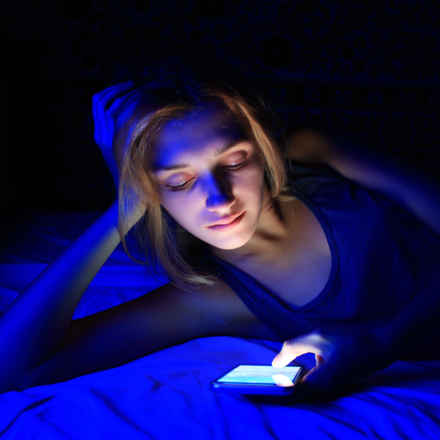Is blue light damaging and are filters worth it?
Posted: Friday 01 September 2023
We often get asked whether blue light is dangerous to the macula and whether blue light filtering glasses are worth getting. Recent research has shown that blue light filters often do not live up to the claims they make.
Below we answer your questions and look into the research in more detail:
What is Blue Light?
Blue light is part of the visible light spectrum, the light which can be seen by the human eye. Blue light is found in both sunlight and artificial light sources (such as LED lights and computer or phone screens), however the great majority of your exposure comes from the sun.
Does Blue Light affect the eyes?
Blue light has the highest amount of energy in the light spectrum. This high energy means it is more powerful and it has been speculated that the high energy of blue light may have a damaging effect on the retina.
Recently, with people spending more time looking at screens there has been a rise in the marketing of blue light filtering glasses. These have been sold as a way to reduce the potential damage from blue light as well as relieve eye strain and improve sleep.
However, as the macula and retina is right at the back of the eye, the lens and cornea at the front of the eye is able to filter out most of the blue light.
Are Blue Light filtering glasses worth buying?
A recent review of studies into blue light filtering glasses found that they had no impact on eye strain or sleep quality. The study also found no evidence to support that these filters have any impact on retinal health.
The study also highlights that these glasses are only able to filter 10 to 25 percent of the blue light, and that daylight contains a thousand times more blue light than artificial sources.
This new study supports the College of Optometrists, and Association of Optometrists' position on blue light glasses. They agree that there is not enough evidence to prove blue blocking filters will improve vision, or that blue light leads to damage to eye health.
What does this mean?
This research shows that there is limited evidence that blue light from computer, tablet or phone screens has an impact on macular health. There is no evidence to suggest that you should stop using these devices, especially when many people rely on them as a low vision aid. There is also no need to stop using artificial light sources such as LED lights to prevent macular damage.
While blue light glasses may not help with sleep quality or eye strain, some people with macular disease may still use blue-blocking lenses to help reduce glare.
Want to stay up to date with the latest research?
Sign up to our monthly enewsletter today.
Other research feature studies
The truth behind the headlines on sight loss, “cures” for blindness and research breakthroughs.
Explore our research
Beating macular disease through funding medical research and improving the lives of those living with macular disease.




